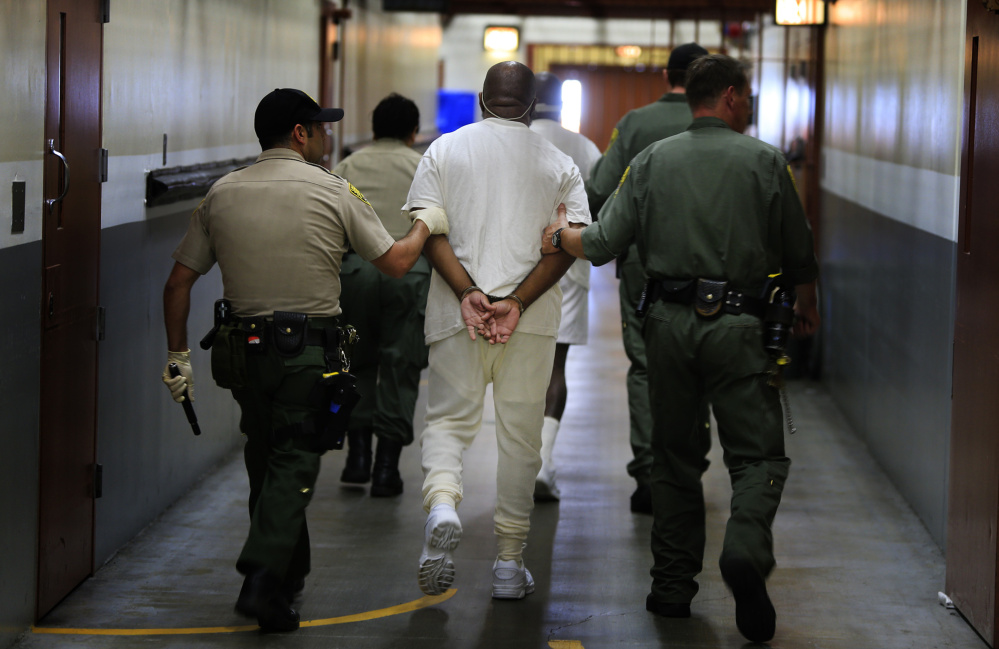WASHINGTON — Luis Anthony Rivera was sentenced to life behind bars plus 140 years for his role in a 1983 cocaine-smuggling scheme, but one night last week, just after midnight, he walked out of a Florida penitentiary a free man.
Francois Holloway was similarly sent home this summer, well short of the 57-year sentence he received in 1996 for multiple carjackings, a punishment that could have kept him locked up until age 89.
The little-noticed releases of Rivera and Holloway are pointing the way toward an unconventional method for gaining early release for nonviolent prisoners who have unblemished records during incarceration.
The White House and many members of Congress have been trying for several years to address what officials in both parties see as unduly harsh sentences, particularly of black and Latino men. But at the Department of Justice, requests for clemency, commutations and pardons just keep piling up.
Last year, President Obama announced a new effort to free some nonviolent offenders serving disproportionate sentences, and more than 35,000 prisoners applied. But so far only 46 have been released. Lengthy reviews of applications are choking the system, officials say.
The federal prison system, meanwhile, is near to bursting. The cost to taxpayers to house a federal inmate has doubled in the last 30 years, to $31,000 a year, with many convicts aging and in need of specialized care.
PROSECUTORS AGREED NOT TO FIGHT
“The long prison terms for drug traffickers, violent felons and habitual criminals means that the number of elderly, infirm and dying prisoners will increase,” said Paul J. Larkin Jr., senior legal research fellow at the Heritage Foundation. “And with it, the cost of their care.”
On the other side, Jon Adler, national president of the Federal Law Enforcement Officers Association, warned his membership in August that the “release of these federal prisoners does not benefit the American public.”
Rivera and Holloway asked federal judges for leniency, something that happens frequently, and federal prosecutors agreed not to fight, which is rare.
The original sentencing judges agreed to take a fresh look at the punishments of the two men. Assured that both had turned their lives around, the judges and prosecutors agreed to vacate parts of the original convictions and reduce their sentences to “time already served.”
OPENING THE DOOR TO MORE
Legal experts predict the cases could open the door to similar requests by many more prisoners if federal prosecutors are willing to take the same approach elsewhere.
“That’s a pretty novel way to do things,” said Marc Mauer, executive director of the Sentencing Project, a Washington-based advocacy group. “I’ve not run across a lot of people who ever get out that way, and we get letters every day from people wanting help.”
Mauer predicted that the Rivera and Holloway examples will prompt defense lawyers around the country to seek similar relief for clients and will give judges “a level of comfort” in agreeing.
Holloway’s case went to court last year in Brooklyn, where the top federal prosecutor at the time was U.S. Attorney Loretta Lynch, who is now attorney general. Lynch at first resisted his release, suggesting he seek a presidential commutation. But she ultimately agreed not to oppose his appeal.
The original sentencing judge, John Gleeson, a former prosecutor who had put Mafia boss John Gotti in prison, noted that Holloway had served more time for three carjackings than “if he had committed first-degree murder.”
In the Rivera case, federal prosecutors in Muskogee, Okla., agreed this summer not to block his release after Rivera’s attorneys convinced federal Judge Frank H. Seay that continuing to hold him was a waste of taxpayer money.
Send questions/comments to the editors.



Comments are no longer available on this story